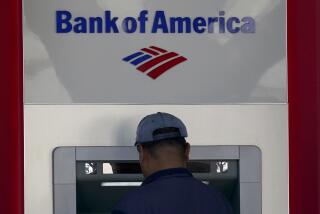How Will Bank Merger Affect Your Accounts?
- Share via
Wondering what will happen to your checking, savings, credit card or mortgage now that San Francisco-based BankAmerica Corp. and NationsBank Corp. of Charlotte, N.C., have agreed to merge?
Bank officials are not willing to telegraph details because the deal is a long way from final approval. In addition to shareholder go-aheads, the BankAmerica-NationsBank merger must be sanctioned by regulators.
“It’s just too soon to say,” says Harvey Radin, a Bank of America spokesman. “It will be months before everything is worked out.”
But merger mania in the banking industry has set plenty of precedents indicating what bank customers might expect. Here’s a look.
*
Question: Will the terms of my BofA mortgage change?
Answer: No. A mortgage is a contractual agreement that cannot be altered significantly regardless of who owns your loan. Your mortgage loan documents stipulate the interest rate; the term--say, 15 or 30 years; the date that mortgage payments are due and the penalties that will be imposed if payments are late. It will also say whether you can pay off the loan early without penalty. The only thing that may change is where your payments are sent.
*
Q: Is the same true of credit card loans?
A: No. All that’s required to alter the terms and conditions of a credit card deal is that the issuer give cardholders proper notice. Usually that involves sending a letter or brochure with monthly statements spelling out the changes and when they become effective.
BofA cardholders should be particularly careful to read any “junk mail” that comes with future credit card statements so they don’t miss anything important.
*
Q: What about my checking account? Are the fees or services likely to change?
A: Probably. But they won’t change until the merger goes through, and that’s not likely to happen until next fall.
Normally, checking account customers are notified of changes by mail some months after a merger is completed. The letter will present details of the acquiring bank’s checking options, often highlighting the options that are most like the customer’s current account. Customers can choose an option or have the bank automatically transfer their money into the checking programs that closely mirror their accounts.
*
Q: Does the same hold true with savings accounts?
A: Yes.
*
Q: What about automated teller machine access? Will the bank start charging fees if I want to use the ATM--or use someone else’s ATM?
A: That depends on your checking account agreement. Most banks offer an “ATM checking” option, which gives unlimited and fee-free access to the bank’s own ATM machines in most locations. This merger could simply extend that access to more machines--those owned by NationsBank.
Meanwhile, when you use another bank’s ATM machines you may be charged by both your own bank and the bank that hosts that particular ATM. Some banks waive ATM fees for good customers.
*
Q: What about personal and small business loans?
A: These loans generally are governed by contracts, which spell out pertinent details, such as interest rates and fees. The bank may not change contractual terms without the express agreement of the borrower. However, most personal and small business loans also have set dates when the loan must be paid off or renewed by mutual agreement. At that point, if the bank wants to change the terms and you don’t agree, you may be forced to pay off the loan.
More to Read
Inside the business of entertainment
The Wide Shot brings you news, analysis and insights on everything from streaming wars to production — and what it all means for the future.
You may occasionally receive promotional content from the Los Angeles Times.










